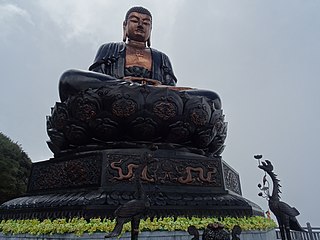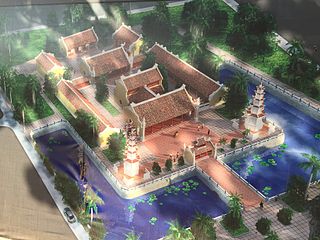The Việt Minh is the common and abbreviated name of the League for Independence of Vietnam, which was a communist-led national independence coalition formed at Pác Bó by Hồ Chí Minh on 19 May 1941. Also known as the Việt Minh Front, it was created by the Indochinese Communist Party (ICP) as a national united front to achieve the independence of the Democratic Republic of Vietnam.
Articles related to Vietnam and Vietnamese culture include:

Ninh Bình is a province of Vietnam in the Red River Delta region of the northern part of the country. The province is famous for a high density of natural and cultural attractions, including reserved parks in Cúc Phương National Park and Vân Long, grotto caves and rivers in Tràng An, Tam Cốc-Bích Động and Múa Caves, historic monuments in the Hoa Lư ancient capital, Vietnam's largest buddhist worshiping complex, and the Phát Diệm Cathedral with "eclectic architectural style". Thanks to its adjacency to Hanoi, day trips from the capital are easily manageable.

Buddhism in Vietnam, as practiced by the Vietnamese people, is a form of East Asian Mahayana Buddhism. It is the main religion in Vietnam. Vietnamese Buddhism is generally inclusive and syncretic, drawing on the main Chinese Buddhist traditions, such as Tiantai and Huayan, Zen (Thiền), and Pure Land.

The Vietnam Football Federation is the governing body of football in Vietnam. It is responsible for the all Vietnamese teams of association football, futsal and beach soccer as well as national competitions.
Hậu Lý Nam Đế was the last king of the Early Lý dynasty, founded by his cousin Lý Nam Đế. He reigned in Vạn Xuân from 571 to 602.

The majority of Vietnamese do not follow any organized religion, instead participating in one or more practices of folk religions, such as venerating ancestors, or praying to deities, especially during Tết and other festivals. Folk religions were founded on endemic cultural beliefs that were historically affected by Confucianism and Taoism from ancient China, as well as by various strands of Buddhism. These three teachings or tam giáo were later joined by Christianity which has become a significant presence. Vietnam is also home of two indigenous religions: syncretic Caodaism and quasi-Buddhist Hoahaoism.
The Unified Buddhist Sangha of Vietnam was founded in 1964 as a Buddhist organization in Vietnam. It was banned by the government of Vietnam in 1981. It continues to operate in exile outside Vietnam.

Ven. Thich Nhat Tu or Thích Nhật Từ (釋日慈) in Vietnamese is a Vietnamese Buddhist reformer, an author, a poet, a psychological consultant, and an active social activist in Vietnam. He is committed to propagate Buddha's teachings through education, cultural activities and charitable programs in order to benefit the individuals and the society at large.

The Vietnam Buddhist Sangha is the only Buddhist sangha recognised by the Vietnamese government, and a member of the Vietnamese Fatherland Front. It was founded after Vietnam's Buddhist Convention at Quán Sứ Pagoda on November 7, 1981, to unify Buddhist activities of Vietnamese monks, nuns and lay followers.

The Early Lý dynasty, also known in historiography as the Former Lý dynasty or Anterior Lý dynasty, officially Vạn Xuân, was a dynasty of Vietnam that existed from AD 544 to 602. Its founder Lý Bí assumed the title of "Southern Emperor". The capital was located at Long Biên within modern-day Hanoi.
The following is a list of political organizations and armed forces in Vietnam, since 1912:

Hoằng Phúc Temple is a temple located in Thuan Trach Village, Mỹ Thủy Commune, Lệ Thủy District, Quảng Bình Province, North Central Coast Region of Vietnam. The temple has a history of more than 700 years, one of the oldest temples in Central Vietnam.

Thich Phuoc Ngoc or Dhammananda Thero Thich Phuoc Ngoc - a Buddhist monk is a Venerable of Sri Lanka Buddhist Sangha. He has been known for positive contributions to humanitarian and social security activities, is the founder of the first Buddhist orphanage in Vietnam.

Thích Minh Tuệ (1981-), born Lê Anh Tú, is a Vietnamese Buddhist monk. After briefly practicing at a pagoda after giving up his job as a land surveyor, Thich Minh Tue decided to "learn and follow the Buddha's teachings" by observing the 13 ascetic practices of Theravada Buddhism and walking for alms across the country for many years. His 2024 walking journey attracted the attention of the Vietnamese public, attracting thousands of people to meet him and at times up to hundreds of people to follow him, leading to many social and security disturbances, and turning him into an "unwilling" Internet celebrity. Thich Minh Tue started his pilgrimage to India in December 12th 2024, after a period of seeking support from people familiar with the relevant administrative procedures. He plans to walk through Laos, Cambodia,Thailand, Myanmar and Bangladesh before entering India. In the volunteer group accompanying him were backpacking vlogger Le Kha Giap and Dr.Doan Van Bau, Deputy Head of the Department of Psychology People's Security University, along with a number of other mendicants.
This page is based on this
Wikipedia article Text is available under the
CC BY-SA 4.0 license; additional terms may apply.
Images, videos and audio are available under their respective licenses.










